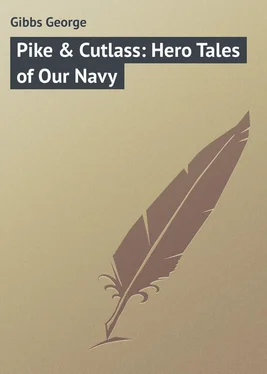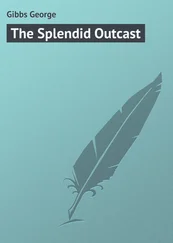George Gibbs - Pike & Cutlass - Hero Tales of Our Navy
Здесь есть возможность читать онлайн «George Gibbs - Pike & Cutlass - Hero Tales of Our Navy» — ознакомительный отрывок электронной книги совершенно бесплатно, а после прочтения отрывка купить полную версию. В некоторых случаях можно слушать аудио, скачать через торрент в формате fb2 и присутствует краткое содержание. ISBN: , Жанр: foreign_prose, на английском языке. Описание произведения, (предисловие) а так же отзывы посетителей доступны на портале библиотеки ЛибКат.
- Название:Pike & Cutlass: Hero Tales of Our Navy
- Автор:
- Жанр:
- Год:неизвестен
- ISBN:http://www.gutenberg.org/ebooks/42138
- Рейтинг книги:3 / 5. Голосов: 1
-
Избранное:Добавить в избранное
- Отзывы:
-
Ваша оценка:
- 60
- 1
- 2
- 3
- 4
- 5
Pike & Cutlass: Hero Tales of Our Navy: краткое содержание, описание и аннотация
Предлагаем к чтению аннотацию, описание, краткое содержание или предисловие (зависит от того, что написал сам автор книги «Pike & Cutlass: Hero Tales of Our Navy»). Если вы не нашли необходимую информацию о книге — напишите в комментариях, мы постараемся отыскать её.
Pike & Cutlass: Hero Tales of Our Navy — читать онлайн ознакомительный отрывок
Ниже представлен текст книги, разбитый по страницам. Система сохранения места последней прочитанной страницы, позволяет с удобством читать онлайн бесплатно книгу «Pike & Cutlass: Hero Tales of Our Navy», без необходимости каждый раз заново искать на чём Вы остановились. Поставьте закладку, и сможете в любой момент перейти на страницу, на которой закончили чтение.
Интервал:
Закладка:
In February, 1778, Biddle went out with a little fleet composed of the “General Moultrie,” 18, the “Polly,” 16, and the “Fair American,” 14, in search of the British squadron. But missing them, they only succeeded in taking a few merchant vessels of the enemy. They boarded a number of Dutch and French ships, and Biddle knew that before long they must fall in with some of the enemy. To Captain Blake, who was dining with him, he said, “I would not be surprised if my old ship should be out after us. As to anything that carries her guns upon one deck, I think myself a match for her.”
On the afternoon of the 7th of March, a sail was made out to windward, and they sailed up to examine her. As she came down with the wind she was made out to be square-rigged; but, bows on, she looked rather like a sloop than a frigate. A short time later she could be made out more plainly a man-of-war, – evidently of the enemy, – coming down speedily, and, from the way she was sailing, able to out-foot any of the squadron. Biddle could see that she stood well out of the water; but a small frigate might do that. And if she was only a frigate of forty guns or under, he promised himself a great battle that day. But if she were a ship of the line, not only the “Randolph” but the smaller vessels were in great danger, for nothing save a craft somewhere near her size could resist the broadsides of the two heavy gun-tiers.
He quickly made his resolution. Signalling to the fleet of cruisers and prizes to go about, he himself took the deck and sent the little “Randolph” boldly down towards the stranger. On she came, bowing majestically over the water, never making a sign until nearing gunshot distance, when the sound of the pipes and the calls on her deck showed that she was clearing ship for action. Biddle had been prepared for an hour. Now, as she came a little closer to the wind, the American captain discovered what he had suspected – two long lines of muzzles running out of her leeward ports.
She was a line-of-battle-ship, then.
He clinched his jaws and looked over his shoulder to where the prizes were scurrying away in the gathering darkness. They at least would be safe. But he did not shift his course a point, sailing on until the canvas of the great ship seemed to tower far above the little spars of his own vessel. The men of the “Randolph” were aghast at the action of their captain. To them an English “Sixty-Four” was the epitome of all that was powerful upon the seas. Biddle thought so, too; but there was nothing of timidity in his voice as he bade his gunners stand by to train upon her. He knew that this battle would be his last, for he resolved in those few moments that he would not give up his ship while one plank of her remained above water. The enemy might blow him out of the water and send him to the bottom, but before she did it he would give them such a lesson in patriotism that the world would not easily forget it.
His men guessed something of what was in his mind, and by the time the big ship hove close aboard they were keyed up to the fighting pitch, waiting with the utmost impatience for the first shot to be fired. The dusk had fallen, but the great loom of the sails of the English frigate showed plainly as she came closer. They were scarcely a pistol-shot apart when a figure on the Englishman mounted the hammock nettings aft, and a voice came clearly across the water, —
“Ahoy, the frigate!”
Biddle paused a moment to gain time, and then giving a word to his division officers, lifted his speaking-trumpet, —
“What ship is that?”
“His Britannic Majesty’s ship-of-the-line ‘Yarmouth,’ Captain Vincent. Who are you? Answer, or I will be compelled to fire.”
Another pause as Biddle directed the American colors to be run up to the mast, and then said, —
“This is the American Continental ship ‘Randolph,’ Captain Biddle!”
Without the pause of a second a tremendous broadside was poured into the Englishman, and in a moment the battle was on.
Biddle had gained a slight advantage in position by waiting as he did, and the “Randolph’s” broadsides did great execution on the crowded decks of her adversary. But the “Yarmouth” men sprang to their guns, and in a few moments were firing their tremendous broadside of thirty guns as fast as they could be served and run out.
On the “Randolph” Biddle’s men were working well, but the crashing of the shot and the flying splinters were terrific. In fifteen minutes the decks were covered with the bodies of dead and dying men, and the surgeon and his mate below in the cockpit, covered with blood, were laboring to help such of those as could be aided, and the decks, in spite of the sand, were so slippery that as the ship rolled it was difficult to stand upright upon them. Many of the guns of one of the broadsides were disabled, and there was not a gun that had a full crew to man it.
Biddle walked to and fro from one battery to another, lending a word here and a hand there, acting as sponger or tackle or handspikeman, wherever he was most needed. The men fought with the energy of despair – the despair of the dying. If they were to die, they would die hard, and the guns were loaded as though they would fire as many times as they could in the short time left them. The English aimed more deliberately. But when the dreaded broadside came, it dealt a blow that shook the smaller ship from stem to stern.
Biddle, although badly wounded, refused to leave the deck, and, ordering a stool to be placed where he could best direct the firing, sat calmly down, though in great agony, and gave the orders to his officers, who repeated them to the men.
It has never been discovered just what happened on the “Randolph.” In spite of her losses, she was keeping up her fire wonderfully, when, with scarcely a warning of any kind, she blew up.
The force of the explosion was so great that the ship split in two, and sank immediately. The air was filled with guns, spars, and the blackened bodies of men, many of which fell upon the deck of the “Yarmouth.” An American ensign, neatly rolled in a ball, ready to be sent aloft on the “Randolph” if the others had been shot away, fell on the quarter-deck of the Englishman unsinged.
That national emblem was all, save a spar or two, that remained of the “Randolph.” Captain Biddle and three hundred and ten of her crew of three hundred and fifteen were blown to pieces and drowned. Four days later the “Yarmouth,” cruising near the same place, discovered a piece of the wreck to which five men, more dead than alive, had managed to cling.
The “Randolph” was lost, but the “Yarmouth” was so badly cut up that she could not follow the chase, and was obliged to lay to for repairs. What, if any, difference there might have been had the “Randolph” not been destroyed by explosion from within it is not easy to say; but all authorities agree that the fight, while it lasted, was one of the most determined in history. Captain Biddle at the time of his death was but twenty-eight years old, and the infant navy and the colonies lost one of their most intrepid officers and gallant seamen.
DECATUR AND THE “PHILADELPHIA”
It was on the deck of the “Enterprise,” before Tripoli, in 1804. The crew had been called aft, and Decatur, smiling, stood on his quarter-deck.
“My men,” said he, “the ‘Philadelphia’ is in the hands of the enemy. A few days from now and we may see American guns turned against American sailors. The commodore has given us permission to sail in and blow her up. Will you go?”
Into the air flew a hundred caps, and three wild American cheers were the answer.
“I can’t take you all,” he explained; “the expedition is a dangerous one. We are going under the broadsides of the enemy, and I only want those of you who are ready. Now, lads, any of you who are willing to go, take one step aft.”
Читать дальшеИнтервал:
Закладка:
Похожие книги на «Pike & Cutlass: Hero Tales of Our Navy»
Представляем Вашему вниманию похожие книги на «Pike & Cutlass: Hero Tales of Our Navy» списком для выбора. Мы отобрали схожую по названию и смыслу литературу в надежде предоставить читателям больше вариантов отыскать новые, интересные, ещё непрочитанные произведения.
Обсуждение, отзывы о книге «Pike & Cutlass: Hero Tales of Our Navy» и просто собственные мнения читателей. Оставьте ваши комментарии, напишите, что Вы думаете о произведении, его смысле или главных героях. Укажите что конкретно понравилось, а что нет, и почему Вы так считаете.












